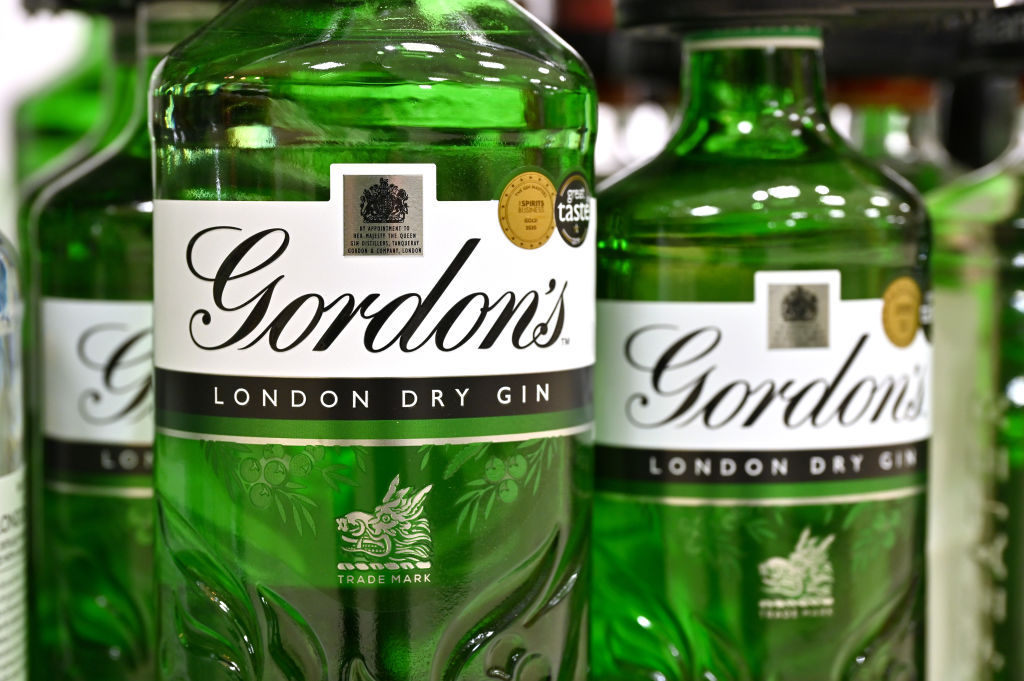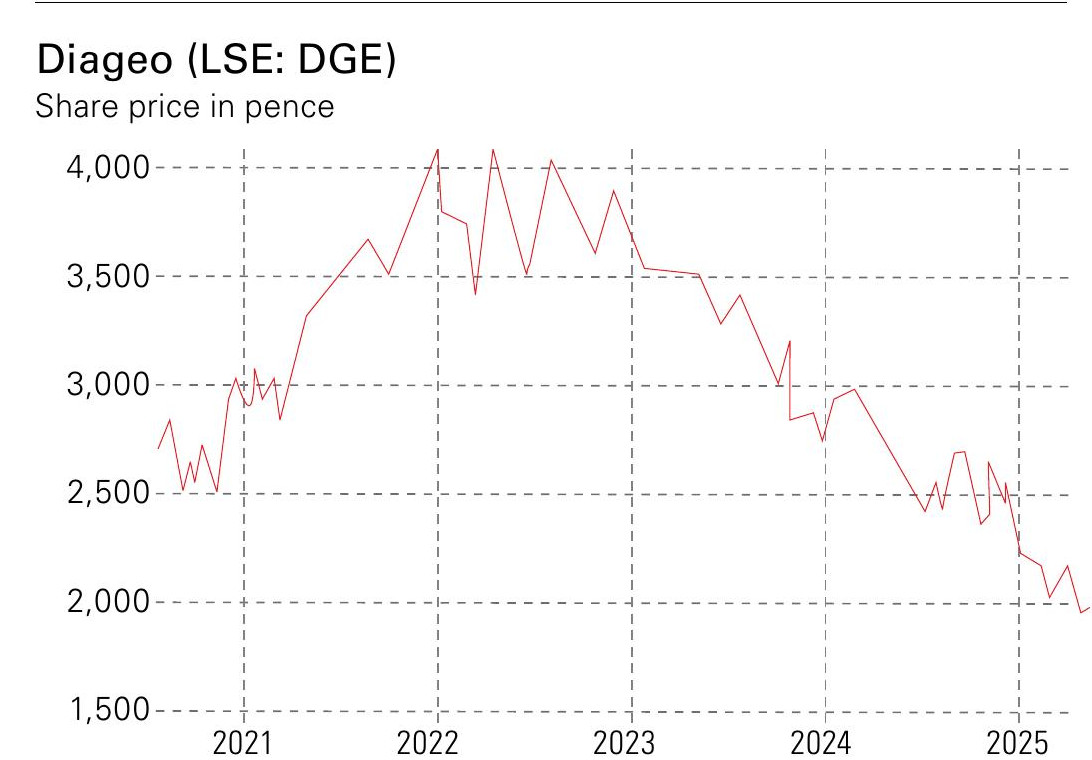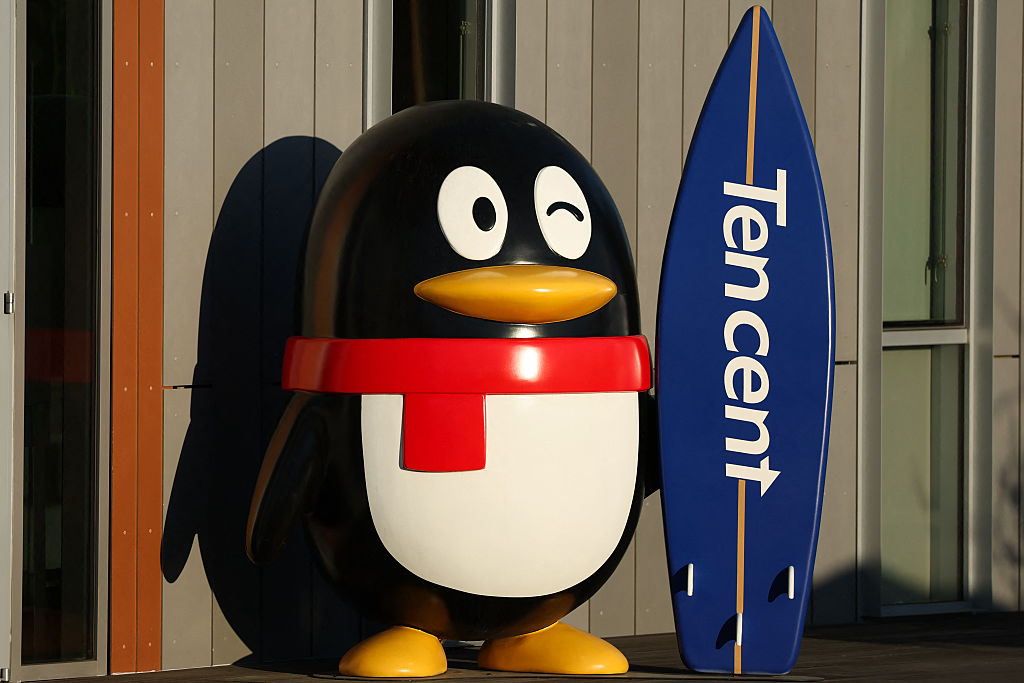Drinks maker Diageo gets back on its feet – should you invest?
Diageo has faced one disaster after another over the past two years. Is it finally time to buy?


Get the latest financial news, insights and expert analysis from our award-winning MoneyWeek team, to help you understand what really matters when it comes to your finances.
You are now subscribed
Your newsletter sign-up was successful
Want to add more newsletters?

Twice daily
MoneyWeek
Get the latest financial news, insights and expert analysis from our award-winning MoneyWeek team, to help you understand what really matters when it comes to your finances.

Four times a week
Look After My Bills
Sign up to our free money-saving newsletter, filled with the latest news and expert advice to help you find the best tips and deals for managing your bills. Start saving today!
Diageo (LSE: DGE) has been a horrible investment to own over the past five years. Since topping out at just over 4,000p in the first quarter of 2022, the shares have slumped by more than 50%. On a total return basis, Diageo has underperformed the FTSE All-Share by nearly 25% per year over the past three years.
However, the underlying story is nowhere near as downbeat. During the pandemic, a significant amount of demand was pulled forward, and although sales have since moderated, they are returning to a long-term trend of growth. At the same time, the company has moved upmarket. Last year, it established the Diageo Luxury Group, which will oversee 15 visitor experiences, as well as the London-based fine wine and spirits retailer Justerini & Brooks and the Scotch brands Brora and Port Ellen. It’s also responsible for marketing products with a “luxury” price point of £100 or more across brands such as Don Julio Tequila, Johnnie Walker Scotch and Cîroc vodka. This will be a cornerstone of the group’s growth in the years to come.
A double whammy for Diageo
Sentiment towards Diageo began to shift significantly in mid-2022 as investors re-evaluated the company’s prospects following the pandemic. Then, in 2023, Diageo lost its long-standing and well-respected CEO, Ivan Menezes, who passed away suddenly, leaving the business in flux. Debra Crew took over, and almost immediately, the company issued a surprise profit warning related to overstocking in Latin America and the Caribbean. Sales in these two regions fell by 20%, resulting in a 1% decline in group sales for the first half of fiscal 2024.
MoneyWeek
Subscribe to MoneyWeek today and get your first six magazine issues absolutely FREE

Sign up to Money Morning
Don't miss the latest investment and personal finances news, market analysis, plus money-saving tips with our free twice-daily newsletter
Don't miss the latest investment and personal finances news, market analysis, plus money-saving tips with our free twice-daily newsletter
This double whammy left the company and its investors reeling. Worries continued throughout 2024, and then at the beginning of 2025, Donald Trump began discussing the threat of tariffs. Diageo, which relies heavily on sales of premium spirits such as Scotch and tequila in the US, is doubly exposed to the impact of tariffs. They’ll raise the price of goods for consumers, and the economic disruption may hit demand, too. But these challenges need to be put into perspective.
Diageo’s two main peers, Pernod Ricard (Paris: RI) and LVMH (Paris: MC), have fallen 33% and 37% respectively year-to-date, compared with just 24% for Diageo. And over the past five years, Pernod (which is more exposed to China with its large cognac business) has underperformed Diageo by 7%, excluding dividends.
Guinness and the good news
Nick Train, one of the UK’s top fund managers and a long-term holder of Diageo, said the company’s current valuation presents a “once in a decade opportunity” to “buy a world-class growth business at a trivially low valuation”. Train believes the drivers of Diageo’s success over the past 20 or 30 years remain intact and are, in some cases, strengthening.
Diageo’s Guinness brand is a prime example. Guinness (the UK’s most popular beer) makes up around two-thirds of the group’s beer sales, 16% of total sales.
Over the six months to 31 December, organic sales rose 17%, the fourth year of mid-teens growth.
Diageo noted at its recent Guinness-focused capital markets day in Dublin that, following this growth, production capacity at the St James’s Gate brewery in Dublin is now running at 90%. A new brewery, set to come online in 2027, will help free up space and could boost production by 30%. Diageo will need the extra capacity. Only 12,000 on-trade outlets stock Guinness in Europe, which accounts for just over 5% of the market, so there is a long runway for further growth.
That’s without taking into account Guinness 0.0%, launched in 2020 and now accounting for 26% of the UK’s non-alcoholic beer market. Despite the sales growth, Guinness’s margins are only expected to recover to pre-pandemic levels this year, which is a good illustration of how long it has taken the group to recover from the disruption caused to supply chains and inflation.
Aside from Guinness, Diageo’s premium spirits business is building a strong base with a new generation of consumers. While it’s generally accepted that the younger generation is drinking less, Gen Z are “coming into spirits faster” because they’re drinking the hard stuff with food, as Crew explained recently on the “In Good Company” podcast, with Nicolai Tangen, the CEO of Norway’s sovereign-wealth fund. “We’re seeing an expansion of these socialising occasions coming and they’re quite diversified now,” Crew added. A significant part of this is the popularity with that generation of so-called “third spaces” – not a bar or at home, but a sports arena or a festival. Another part of the trend is paying more for less, such as the £50 100ml bottle of tequila for one or two drinks, rather than a cheaper 750ml bottle.
On the topic of tariffs, Crew was optimistic that the company could navigate the headwinds. “Over time, we have dealt with a lot of duties and tariffs,” says Crew, highlighting India’s alcohol bans and 100% tariffs. “In the long run, we can absolutely mitigate those things.” Train seems to agree. He believes tariffs will eventually be repealed or will become less effective.
Cash-flow growth
With these tailwinds and efforts to cut costs, Diageo expects free cash flow to rise from $3 billion this year through fiscal 2028. This should help dispel concerns over the firm’s debt and dividend sustainability. The stock currently yields 3.7% and, based on current earnings projections (assuming a $150 million tariff headwind), is trading at 16.6 times 2025 earnings, falling below 15 times by 2027. That’s cheap for a business with such a broad portfolio of premium brands, but the shares could certainly get cheaper before sentiment improves.

This article was first published in MoneyWeek's magazine. Enjoy exclusive early access to news, opinion and analysis from our team of financial experts with a MoneyWeek subscription.
Get the latest financial news, insights and expert analysis from our award-winning MoneyWeek team, to help you understand what really matters when it comes to your finances.

Rupert is the former deputy digital editor of MoneyWeek. He's an active investor and has always been fascinated by the world of business and investing. His style has been heavily influenced by US investors Warren Buffett and Philip Carret. He is always looking for high-quality growth opportunities trading at a reasonable price, preferring cash generative businesses with strong balance sheets over blue-sky growth stocks.
Rupert has written for many UK and international publications including the Motley Fool, Gurufocus and ValueWalk, aimed at a range of readers; from the first timers to experienced high-net-worth individuals. Rupert has also founded and managed several businesses, including the New York-based hedge fund newsletter, Hidden Value Stocks. He has written over 20 ebooks and appeared as an expert commentator on the BBC World Service.
-
 How a ‘great view’ from your home can boost its value by 35%
How a ‘great view’ from your home can boost its value by 35%A house that comes with a picturesque backdrop could add tens of thousands of pounds to its asking price – but how does each region compare?
-
 What is a care fees annuity and how much does it cost?
What is a care fees annuity and how much does it cost?How we will be cared for in our later years – and how much we are willing to pay for it – are conversations best had as early as possible. One option to cover the cost is a care fees annuity. We look at the pros and cons.
-
 Three key winners from the AI boom and beyond
Three key winners from the AI boom and beyondJames Harries of the Trojan Global Income Fund picks three promising stocks that transcend the hype of the AI boom
-
 RTX Corporation is a strong player in a growth market
RTX Corporation is a strong player in a growth marketRTX Corporation’s order backlog means investors can look forward to years of rising profits
-
 'AI is the real deal – it will change our world in more ways than we can imagine'
'AI is the real deal – it will change our world in more ways than we can imagine'Interview Rob Arnott of Research Affiliates talks to Andrew Van Sickle about the AI bubble, the impact of tariffs on inflation and the outlook for gold and China
-
 Three companies with deep economic moats to buy now
Three companies with deep economic moats to buy nowOpinion An economic moat can underpin a company's future returns. Here, Imran Sattar, portfolio manager at Edinburgh Investment Trust, selects three stocks to buy now
-
 Should you sell your Affirm stock?
Should you sell your Affirm stock?Affirm, a buy-now-pay-later lender, is vulnerable to a downturn. Investors are losing their enthusiasm, says Matthew Partridge
-
 Beeks – building the infrastructure behind global markets
Beeks – building the infrastructure behind global marketsBeeks Financial Cloud has carved out a lucrative global niche in financial plumbing with smart strategies, says Jamie Ward
-
 Investing in space – finding profits at the final frontier
Investing in space – finding profits at the final frontierGetting into space has never been cheaper thanks to private firms and reusable technology. That has sparked something of a gold rush in related industries, says Matthew Partridge
-
 Three promising emerging-market stocks to diversify your portfolio
Three promising emerging-market stocks to diversify your portfolioOpinion Omar Negyal, portfolio manager, JPMorgan Global Emerging Markets Income Trust, highlights three emerging-market stocks where he’d put his money